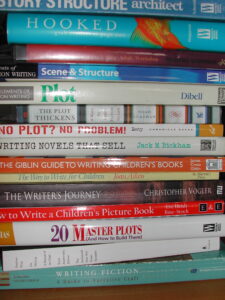I have an addiction…to writing craft books. In my bookcase two entire shelves are devoted to them, easily 15% of my entire fiction/nonfiction library. I find a new one or two every year, and believe me I learn something from each. Some of my old favorites have gone out of print, sadly, but most are still available, which just goes to show that craft books age very well.
Every so often I like to share my favorites with you. So here we go with five that I love. (You can order any of these, and others I love, through my Bookshop affiliate link.)
- Story Genius: How To Use Brain Science to Go Beyond Outlining and Write a Riveting Novel, by Lisa Cron
Why I love it: First, I’m a nut for anything that has to do with brain science, and Cron makes a compelling case for the way that our brains process story. Second, she provides a template for thinking of character development and story arc in terms of how we process story – and can’t we all use a template?
Caveats: I’ve read the first half of this book over and over, and applied her techniques to my writing, and love them. But in the second half she makes a case for planning a novel that goes against my pantsing grain. I just don’t read past part 1.
- Steering The Craft: The Twenty-first Century Guide to Sailing the Sea of Story, by Ursula Le Guin
Why I love it: Who doesn’t love Le Guin?? In this simple, short book she tackles very specific issues, one per chapter, with clear explanations of what they are and how to deal with them, and includes useful exercises at the end of each chapter.
Caveats: It’s not comprehensive, but sometimes you need something this short and sweet.
- The Fiction Editor, The Novel, and the Novelist: A Book for Writers, Teachers, Publishers, and Anyone Else Devoted to Fiction, by Thomas McCormack
Why I love it: This little book gave me an insight into one of the core principles of story-telling, which McCormack defines as “the master-effect”, or that feeling that you can’t let go of when you’ve finished reading a great book. It’s singularly responsible for any success of The Charmed Children of Rookskill Castle.
Caveats: This is a somewhat erudite book, not for reading when you’re tired.
- Writing Fiction, Tenth Edition: A Guide to Narrative Craft, by Janet Burroway and Ned Stuckey-French
Why I love it: This is probably the most comprehensive craft book, ever. It’s like an MFA in paperback form. Superbly detailed explanations of craft issues, accompanied by excellent examples, and a bunch of exercises. It’s been re-issued over and over, so look for the most recent edition. You could spend a year just working through this one.
Caveats: You could spend a year just working through this one.
- Consider This: Moments in My Writing Life After Which Everything Was Different, by Chuck Palahniuk
Why I love it: Alternately funny, irreverent, and incisive, this book is like taking a writing workshop with someone who really knows what he’s talking about, and makes you laugh while you learn. Lots of unusual ways of looking at craft.
Caveats: Palahniuk wrote Fight Club, and sometimes you feel like that’s the book you’re reading.
Again, you can find any of these books, and others I love, here, or at your favorite indie bookseller.
Do you have a favorite you don’t see on my lists? Please share! (I’ll probably order it…) Next time, I’ll review some of my more “classic” favorites.


I have a number of these also. Steering the Craft is a favorite!
I love STORY by Robert McKee. Though it is for screenwriters, the writing tips are on point for book authors.
Ooo – that’s one of my favorites, too! I’ll featuring that in an upcoming on “classics”. I will always wish I’d been able to take his live course.